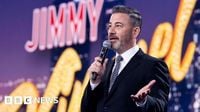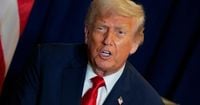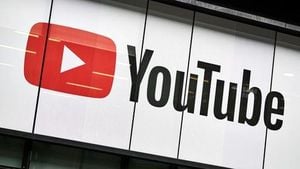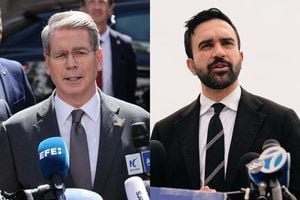Jimmy Kimmel’s return to late-night television on September 23, 2025, was anything but quiet. After a six-day suspension from ABC, the host of Jimmy Kimmel Live! walked back on stage to deliver a nearly 18-minute monologue that was at once defiant, emotional, and sharply political. The controversy, which erupted after comments Kimmel made about conservative activist Charlie Kirk, has since ballooned into a full-blown national debate over free speech, the power of media companies, and the reach of political influence in American entertainment.
“I’m happy to be here tonight with you,” Kimmel told his audience, his voice catching at times as he acknowledged the outpouring of support and criticism he’d received over the past week. The host didn’t shy away from the elephant in the room: his suspension, which was triggered by remarks made in his September 15 monologue. Those comments, linking the suspected shooter of Charlie Kirk to the so-called “Maga gang” and joking about former President Donald Trump’s reaction, quickly drew the ire of Federal Communications Commission (FCC) Chairman Brendan Carr. Carr threatened action against ABC, and major media companies Nexstar Media Group and Sinclair Broadcasting Group—both owners of numerous ABC affiliates—responded by preempting Kimmel’s show.
According to TIME, the backlash was immediate and intense. Many Disney subscribers, upset by what they saw as a violation of free speech, canceled their streaming subscriptions. Hundreds even marched at Disney’s Burbank office in protest. Kimmel, for his part, insisted, “That’s not legal. That’s not American. That is un-American, and it is so dangerous.” He went on to thank not only his supporters but also those who “don’t support” his show or beliefs, yet “support [his] right to share those beliefs anyway.” He singled out Republican Senators Mitch McConnell, Rand Paul, and Ted Cruz, as well as conservative commentator Ben Shapiro, for their principled stance on free expression, even when they disagreed with him.
The show’s return was made possible by an agreement struck between Disney and Kimmel’s team. As reported by Deadline, the deal came with no new restrictions on Kimmel’s speech. “Jimmy will say what Jimmy wants to say,” an unnamed source told the outlet. Kimmel acknowledged the risk Disney was taking: “At the end, even though they didn’t have to, they really didn’t have to—this is a giant company, we have short attention spans, and I am a tiny part of the Disney Corporation—they welcomed me on the air, and I thank them for that, because I know that unfortunately, and I think unjustly, this puts them at risk.”
Still, not everyone was pleased with Kimmel’s reinstatement. Chief among his critics was President Donald Trump, who took to Truth Social to lambast the host and ABC. “I can’t believe ABC Fake News gave Jimmy Kimmel his job back,” Trump wrote, accusing Kimmel of being a “Democrat mouthpiece” and suggesting that his show amounted to a “major Illegal Campaign Contribution.” Trump even threatened further legal action against ABC, referencing a $16 million settlement Disney paid him in a previous defamation lawsuit involving ABC News anchor George Stephanopoulos. “Let’s see how we do. Last time I went after them, they gave me $16 Million Dollars. This one sounds even more lucrative,” Trump wrote, hinting at a new legal battle on the horizon.
Kimmel didn’t back down from the political firestorm. In his monologue, he addressed the controversy over his remarks about Kirk, clarifying, “It was never my intention to make light of the murder of a young man, nor was it my intention to blame any specific group for the actions of what was obviously a deeply disturbed individual.” He conceded that some viewers may have found his comments “ill-timed or unclear,” adding, “I get why you’re upset.” But Kimmel also made it clear he would not be silenced by his critics. “This show is not important. What is important is that we get to live in a country that allows us to have a show like this.”
According to BBC News, Kimmel’s stance resonated with many in the entertainment industry and beyond. Fellow late-night hosts Stephen Colbert, Jon Stewart, Jimmy Fallon, and Seth Meyers publicly supported him. Some conservatives, including Senator Ted Cruz and podcaster Joe Rogan, also argued that it’s not the government’s role to dictate what comedians can say. However, the rift was clear: Nexstar and Sinclair continued to preempt Jimmy Kimmel Live! on their ABC affiliates, stating they would air local news and other programming “pending assurance that all parties are committed to fostering an environment of respectful, constructive dialogue.”
The episode wasn’t without its lighter moments. Kimmel enlisted actor Robert De Niro for a comedic segment lampooning the FCC’s alleged suppression of free speech. De Niro, playing the new FCC chairman, joked, “You want to say something nice about the president’s beautiful thick yellow hair and how he can do his make-up better than any broad, that’s free. But if you want to do a joke like, ‘He’s so fat he needs two seats on the Epstein jet,’ that’s going to cost you.” The bit drew laughs but underscored the real tension between political power and media freedom.
Across the media landscape, reactions to Kimmel’s return were mixed but passionate. LateNighter founder Jed Rosenzweig told BBC News, “Jimmy Kimmel proved last night that his strength as a broadcaster isn’t just in telling jokes, but in commanding the room when the stakes are highest.” Deadline’s Dominic Patten said Kimmel “more than met the moment Tuesday.” But not all critics were impressed. The Telegraph’s Kara Kennedy dismissed Kimmel’s “self-pitying monologue,” while The New York Times’ Mark Walker noted that some on the right accused Kimmel of faking his emotion and not being sufficiently apologetic.
Underlying the spectacle is a deeper question about the boundaries of satire, the responsibilities of broadcasters, and the health of American democracy. Kimmel, whose contract with ABC reportedly expires in May 2026, appears determined to use his platform to push back against what he sees as creeping censorship. “A government threat to silence a comedian the president doesn’t like is anti-American,” he declared. “That’s anti-American.”
As the dust settles from Kimmel’s dramatic return, one thing is clear: the battle over free speech, political influence, and the role of comedy in American life is far from over. With both sides digging in, and the eyes of the nation watching, late-night television has once again become a stage for some of the country’s most urgent debates.





